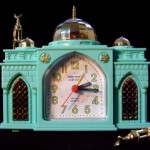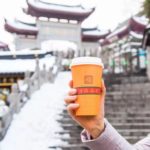OUSHOP and the construction of authenticity
The Oxford University Shop offers a good example of how capitalist actors make “use of regional identities and aspects of heritage to construct and market cultural production they hope will be construed as authentic in regional and global markets” (Cavanaugh and Shankar, 2014, p52). The language surrounding the products of the Oxford University Shop is central in this construction of authenticity, as it creates a link between the commodities displayed in the shop and the University’s prestigious heritage and unique presence in time and place. Through mainly linguistic means, the shop seeks to establish meaningful connections between its commodities and the historical identity and aura of Oxford University. The shop board at the entrance is emblazoned with the Oxford University crest, along with the following sentence: “Supporting The University”, thus establishing a relation of identity and proximity with the University of Oxford, and projecting the shop as an authentic Oxford institution. The idea that the shop actively “supports” the University conveys an implicit representation of consumption as an authentic experience, as a means by which tourists can contribute to the maintenance of a prestigious and historical institution. The shop is therefore not merely a space for tourists to buy anonymous goods, insofar as tourists are invited through the act of purchase to participate in the noble and historical task of supporting the university.
Moreover, authenticity is marketed to tourists through the use of recurring linguistic motifs emphasising the official and exclusive character of the shop and its merchandise, and the fact that its connection with the University does not merely reside in a crest, but is grounded in a shared institutional reality. The price tags and labels on goods indeed repeatedly feature messages underlining officialness: “official mark of the University of Oxford”, “official product”, “official exclusive product”, “official Oxford University Merchandise” etc. The Oxford University Shop goods are thus authentic because they are official and exclusive, they are sanctioned by the University of Oxford, and constitute material depositaries of its aura and prestige as a unique presence in space and time. Tourists will therefore not merely be consuming anonymous objects of mass production, but will be acquiring cultural tokens that embody the ancient identity of Oxford University. Some of the price tags also feature short descriptions emphasising the historical depth of the University: “As the Oldest University in the English-speaking world, Oxford is a unique and historic institution. There is no clear date of foundation, but teaching existed at Oxford in some form in 1096”. Again, authenticity is here marketed to tourists by connecting the shop with the university, and investing commercial goods with the latter’s aura, thus “transforming heritage as a sign of authenticity into economic value” (Cavanaugh and Shankar, 2014, p55)
The example of the Oxford University Shop thus emphasises the fact that the production of authenticity often hinges on the construction of “Chronotopes”, defined by Cavanaugh and Shankar as the “links created across events that occur in different places at different times” (Cavanaugh and Shankar, 2014, p52). The shop indeed offers an exemplary case of how actors make use of linguistic elements to connect their products to “places, times, bodies and knowledge, and practices” (Cavanaugh and Shankar, 2014, p56-7). It is through these connections that authenticity is generated, that heritage and regional identity are put into the service of economic value and mobilised in the process of capitalist profit-making. Through a number of linguistic practices, OUSHOP draws on the prestige and aura of Oxford University to construct and market itself as an authentic institution offering a number of official and exclusive objects. The shop does its best to make the aura of Oxford University present in the Shop, notably through recurring linguistic motifs on price tags and its use of the University’s logo as a brand logo. All these practices together contribute to the construction of the Oxford University Shop as an “authentic Oxford experience”, offering cultural tokens that embody the identity and heritage of Oxford University.
Bibliography:
Cavanaugh, J, R. and Shankar, S. (2014). Producing Authenticity in Global Capitalism: Language, Materiality, and Value. American Anthropologist
Contributed by williamgoodchild on 11/02/2020






